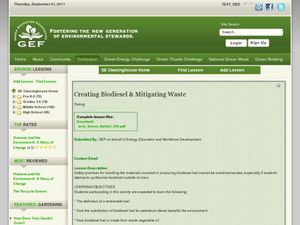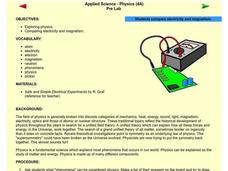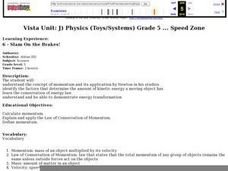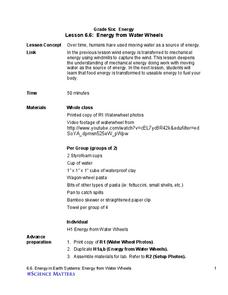Curated OER
Toboggan Science
Students conduct toboggan time trials to investigate the variables that have the greatest effect on toboggan speed. In small groups, they develop a hypothesis to test and perform three trials on the toboggan run for each variable.
Curated OER
Does Size Matter?
Middle schoolers explore chemical solutions. For this chemistry lesson, students investigate the relationship between three related experiments about solutions. Middle schoolers determine variables that affect the chemical concentration...
Curated OER
Science of War
Tenth graders, from an environmental perspective, study the pros and cons of war. Distinctions between characteristics of biological, chemical and nuclear threats and the impact of economic development are considered.
Curated OER
Earth Matters
Students identify Earth's equator, prime meridian, lines of latitude, lines of longitude, parallels, and meridians.
Curated OER
Circle of Pong
Students, in groups, use given materials to devise a way to deposit a ping-pong ball into a paper cup that is located in the middle of a 6-foot diameter circle, while standing outside the circle.
Curated OER
The Penny Factory
Fourth graders identify the characteristics of a simple physical and chemical change. They describe objects by the properties of the materials from which they are made and separate or sort items using these properties. Students explain...
Curated OER
Design a Bobsled
Students apply their knowledge of friction, drag, mass and gravity as they design, build, and test mini-bobsleds.
Curated OER
Creating Biodiesel and Mitigating Waste
Biotechnology pros produce their own biofuel using waste oil and fresh vegetable oil. They test the quality of their product using titration techniques and pH analysis. They write their observations and report their findings. Be aware...
Curated OER
Wright Again: 100 Years of Flight
Aspiring aeronautical engineers demonstrate different forces as they construct and test paper airplanes. This lesson plan links you to a website that models the most effective paper airplane design, an animation describing the forces...
Curated OER
Changing Planet: Permafrost Gas Leak
Pair earth scientists up to use an amazing online arctic portal mapping tool and Google Earth to analyze permafrost changes. They compare changes to data on atmospheric concentrations of methane to see if there is a correlation. Then...
NASA
Stellar Fingerprints and Doppler Red Shifts
Young scientists observe the spectra of elements and compare that to the Doppler effect. Hook scholars from the beginning all the way to the extension activities in this 5E-format lesson.
Curated OER
The Airplane
Students demonstrate the Bernoulli Principle, review the influences that affected the Wright Brothers, and make and modify paper airplanes. This amazing lesson plan has an excellent structure, and very clear plans for the students to...
Curated OER
Electricity and Magnetism
Fourth graders compare electricity and magnetism. In this science lesson, 4th graders discuss the concepts of electricity and magnetism and brainstorm examples of electrical and magnetic forces.
Virginia Department of Education
The Cycles of Nature
Encourage peer collaboration and assist with the creation of visual aids to identify carbon, water, and nitrogen cycles as your class learns more about nature. They discuss relative information, create a visual aid depicting the chosen...
Urbana School District
Waves
What is a physicist's favorite part of sports? Doing the wave. The presentation covers longitudinal, transverse, surface, and standing waves. It includes in-depth information on frequency, wavelength, period, amplitude, reflection,...
Curated OER
Temperature
Several slides compare different temperature scales. Thermal expansion, heat transfer, and Maxwell speed distribution are also explored. The last two slides seem unrelated to the topic of heat, but are easily left out of this otherwise...
Science Matters
Energy Transfer and Transformation
When you take a simple task and create an exceptionally difficult way to complete it, it is known as a Rube Goldberg machine. These machines are filled with many types of energy transfers and energy transformations. Here, pupils watch...
Science Matters
Energy and Winds
In the study of wind energy, scholars build a small windmill and observe how it transfers wind into mechanical energy. Learners will make connections to the previous lesson with concepts such as the creation of wind through convection.
American Museum of Natural History
Space Jell-O
Might as well learn about how space bends around massive objects while making dessert. A remote learning resource provides an opportunity for scholars to model how stars and planets bend space. They use Jell-O to represent space and...
Curated OER
Slam On the Brakes!
Fifth graders study the concept of momentum and its application by Newton in his studies. They view a demonstration and complete an experiment with toy cars on a racetrack that shows them the properties of momentum and how velocity and...
Science Matters
Potential and Kinetic Energy
Everything has potential energy; learning to use it is the key to understanding all types of energy. Scholars learn the difference between kinetic and potential energy. They then apply the concept to drawing examples of both types of...
Science Matters
Energy from Water Wheels
Historians believe the first vertical water wheel was invented in Rome during the Augustan Age. The sixth lesson plan in the series of 10 has scholars experiment with designing their own water wheels. Through testing various pastas and...
Virginia Department of Education
Molar Volume of a Gas
What is a chemist's favorite plant? Stoichiome Tree! Scholars produce hydrogen gas by reacting magnesium with hydrochloric acid. Then they calculate the molar volume of the gas produced before answering assessment questions.
Normal Community High School
Crystalline Structure
Cubic crystals can have 6, 8, and even 12 sides. Here is a presentation that shows pupils three different kinds of cubic crystalline structures: cubic, body-centered, and face-centered. These structures are then applied to three...

























